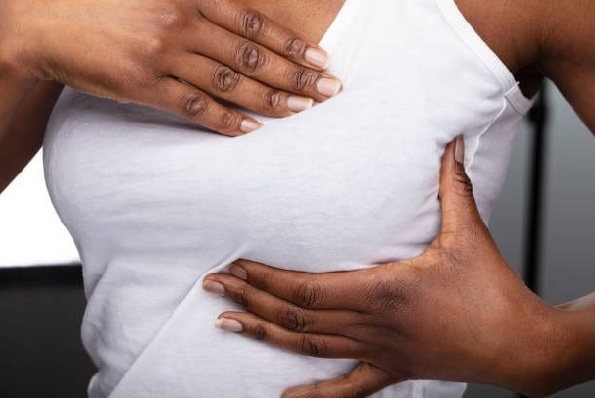A consultant general surgeon and breast cancer specialist, Dr Florence Dedey, has dismissed the widespread claim that men sucking women’s breasts can help prevent breast cancer, describing it as false and misleading.
Speaking in an interview with The Mirror in Accra last Monday as part of Breast Cancer Awareness Month, Dr Dedey, who works with the Department of Surgery of the Korle Bu Teaching Hospital, said there is no scientific or medical evidence to support such a claim, stressing that breast cancer is a complex disease influenced by several biological and lifestyle factors.
“There is no medical evidence that a man sucking a woman’s breast can prevent or even reduce the risk of breast cancer. Breast cancer is a hormonal and cellular condition related to how breast cells grow and divide,” Dr Dedey explained.
She added that the act does not influence hormones or biological processes in any way, so it has no protective effect. However, Dr Dedey emphasised that, rather, regular breastfeeding by mothers has been proven to help lower the risk of breast cancer.
The causes of breast cancer
Addressing the causes of the cancer, the doctor explained that it developed when normal breast cells changed and began to grow uncontrollably.
These abnormal cells can form a lump or mass and if not detected early, may spread to other parts of the body, such as the bones, liver, lungs or brain.
She explained that several factors contribute to breast cancer, including age, family history, genetics and lifestyle habits.
“There are some risk factors that cannot be modified. For instance, being a woman already puts you at risk, and that is something we cannot modify. Growing older also increases your risk, and we have no control over that,” she added.
She noted that, however, there are other risk factors that can be modified or worked on, and as such, encouraged people to avoid alcohol and smoking, live a healthy lifestyle, eat plenty of fruits and vegetables, exercise regularly, maintain a healthy weight and avoid obesity.
Role of breastfeeding
Explaining the role breastfeeding plays in breast cancer risk reduction, the doctor clarified that breastfeeding could help reduce the risk of breast cancer because it directly affects hormone levels in a woman’s body.
She noted that during breastfeeding, estrogen levels are usually lower, and this reduces the chances of abnormal cell growth in the breasts.
However, she warned that this protection is not guaranteed. “Breastfeeding only lowers the risk, but it doesn’t mean a woman who breastfeeds will never get breast cancer. Some women have breastfed many children but still got the disease, and others who have never breastfed but remain cancer-free. The keyword is ‘reducing the risk,” she added.
She stressed that women needed to focus more on regular self-examinations, eating healthy and going for medical check-ups.
Can breastfeeding make it harder to detect breast cancer?
When asked if breastfeeding made it harder for breast cancer to be detected, Dr Dedey explained that during breastfeeding, the breasts may feel heavier and fuller, which can make it difficult to notice lumps or changes.
However, she encouraged women to continue self-examinations after feeding their babies, when the breasts feel softer.
“If you notice a lump that doesn’t go away after some time, pain or any unusual discharge, change in skin colour, or nipple shape, visit the hospital immediately,” she said.
Can breast cancer patients breastfeed?
On whether breast cancer patients could breastfeed from an unaffected breast without any issues, the doctor said the only concern is when the patient is undergoing active breast cancer treatment.
“We do not advise women to breastfeed in such instances; if you are undergoing chemotherapy or radiotherapy, breastfeeding is not recommended because the treatment can affect the baby,” she stated.
She added that, however, if the patient has had treatment and is recovering or has finished treatment, they may breastfeed with the other breast, if it is healthy.
Dr Dedey explained that for those on hormonal or immunotherapy that is not compatible with breastfeeding, it’s best to pause. Once treatment is completed and the doctor gives clearance, they can safely resume breastfeeding.
Dr Dedey urged women to take responsibility for their health by examining their breasts monthly.
“When you get used to your breasts, you’ll easily notice when something is different. Don’t let fear or shame stop you from seeking help. Early detection and treatment make all the difference,” she said.
She concluded by reminding the public that breast cancer can affect anyone, regardless of age, gender or background.
She reiterated that breast sucking is not a preventive measure, admonishing the public to stop spreading misinformation and focus on what truly works: awareness, early detection and healthy living.
She also advised men to support their partners by reminding them to check their breasts regularly, attending medical check-ups with them and encouraging healthy living.

